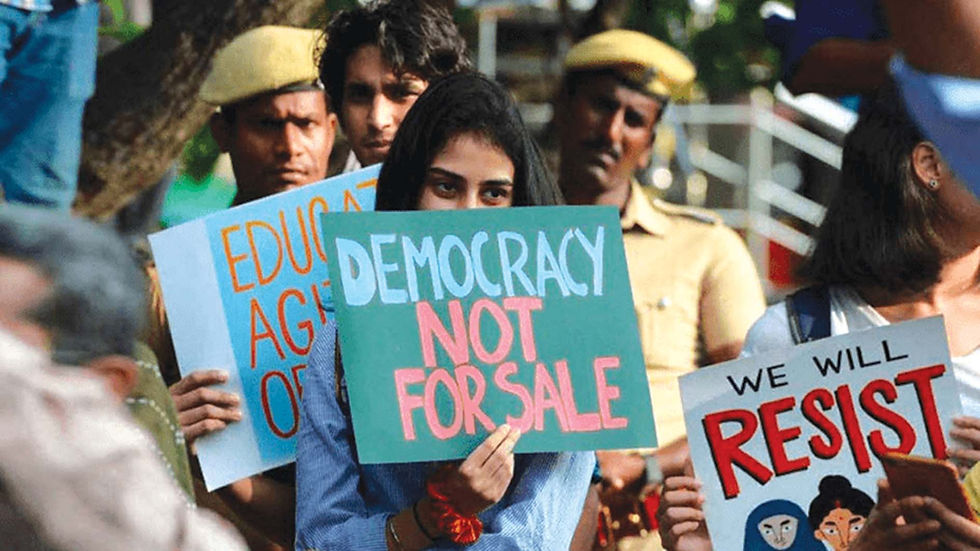Democracy by Bloodline
- Akhilesh Sinha

- Jul 5, 2025
- 3 min read
India’s democracy thrives best when it defies dynasties.

If democracy is rule by the people, then dynastic politics is its betrayal in slow motion. Across India, many political parties operate more like family firms than democratic institutions, controlled not by internal elections but by inherited entitlement. This creeping restoration of monarchy, cloaked in populist rhetoric and electoral legitimacy, has eaten away at the foundations of the republic for decades.
For much of the 75 years since independence, Indian politics has been hollowed out by nepotism. The rise of scams, corruption, terrorism and foreign meddling, some argue, stem not just from administrative incompetence but from the entrenchment of families that treat political power as personal inheritance. Even parties that once emerged from mass movements or regional demands have been reduced to private limited enterprises, where decision-making rests with a patriarch and succession is managed through bloodlines.
It is against this backdrop that Narendra Modi, India’s prime minister since 2014, has positioned himself as the antithesis of this dynastic order. Eleven years into his premiership, Modi continues to draw a sharp contrast between his rise - from a tea-seller’s son to national leader - and the inheritance-driven ascent of political scions in other parties. For his supporters, this personal story is the embodiment of meritocracy in action.
Modi’s Bharatiya Janata Party (BJP) claims to have rooted out nepotism from its organisational culture. Unlike parties where surnames dictate status, the BJP points to its own hierarchy led by men and women of modest means who rose through the ranks of the Rashtriya Swayamsevak Sangh (RSS) and BJP cadre work. In Modi’s telling, this is what differentiates the BJP from the many dynastic parties that span India - from the Samajwadi Party in Uttar Pradesh to the Rashtriya Janata Dal in Bihar, the Trinamool Congress in West Bengal, and the DMK in Tamil Nadu.
Maharashtra offers a case study in dynastic dysfunction. The Shiv Sena, once a formidable regional force, gradually morphed into a private possession of the Thackeray family. After Bal Thackeray, his son Uddhav took the reins, not through internal election but familial inheritance. In 2019, Uddhav became Chief Minister through a post-poll alliance with ideological rivals – the Congress and the Nationalist Congress Party (NCP) - in what was seen by critics as an opportunistic grasp at power.
When the internal rift emerged within Shiv Sena in 2022, 39 of its 55 MLAs defected, citing lack of internal democracy and the high-handedness of Uddhav Thackeray. The MLAs elected a new legislative party leader and communicated their withdrawal of support to the Maha Vikas Aghadi(MVA) government. What followed was a constitutional tussle, marked by legal ambiguity and political drama. Uddhav eventually resigned, but not before decrying the manner in which he had been unseated.
The NCP, too, reveals how dynastic ambitions can fracture a party. Once helmed by Sharad Pawar, the party has splintered as family members jostle for succession. While nepotism has always existed in Indian politics, its consequences today seem particularly acute: loss of administrative accountability, criminalisation of politics and the transformation of public offices into private fiefdoms.
The Maha Vikas Aghadi government became synonymous with scandal. Allegations of corruption, extortion and money laundering dogged top ministers. Anil Deshmukh, the former home minister, was jailed. Nawab Malik, another cabinet minister, followed. The episode lent weight to Modi’s broader claim that nepotistic parties not only hollow out democracy but enable criminal behaviour under a protective dynastic umbrella.
The pattern repeats across India. In Uttar Pradesh, the Samajwadi Party’s reliance on the Yadav family has been both its strength and its Achilles’ heel. The party’s rule witnessed communal riots, lawlessness and eventually a public backlash. The BJP, promising ‘suraaj’ (good governance) and development, capitalised on the disorder to expand its base.
It would be naive, however, to claim that the BJP is entirely immune to dynastic temptation. Several BJP leaders, especially at the state level, have family members active in politics. Yet the central party leadership remains largely controlled by self-made individuals. Compared to regional outfits where succession is a foregone conclusion, the BJP still offers a more competitive internal ladder.
The persistence of family politics in India is not simply a structural flaw; it is a cultural phenomenon. Voters often associate familiar surnames with trust, continuity and recognition. Dynasts are not always untalented; many are well-educated and politically savvy. But when parties cease to function as democratic platforms and instead become vehicles for family advancement, the consequences can be corrosive.
India’s democracy has survived despite its dynasties but it will flourish only when citizens reject entitlement and demand accountability.
In an era of economic aspiration and digital transparency, public patience for family rule is thinning. The road to restoration runs not through bloodlines, but ballots.
(The writer is a senior Patna-based journalist and political analyst





Comments